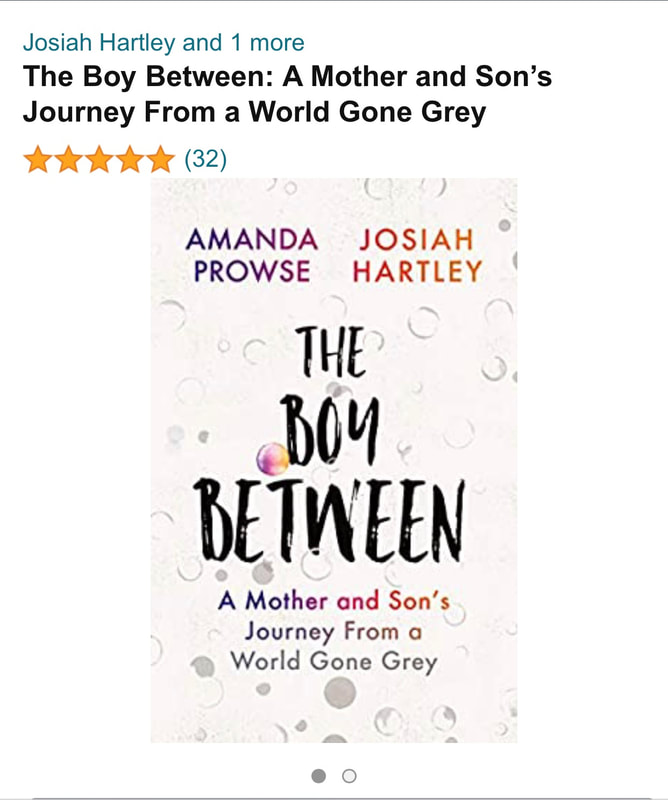Amanda is a well known and respected author, who isn’t afraid to write about difficult subjects, (abuse, loss of a baby, affairs, alcoholism, eating disorders to name but a few), I have no reason to doubt that writing this book with Josh was on a whole new level of difficult.
This collaboration is written by both Josh and Amanda, alternating between one another per chapter both documenting their consecutive thoughts, feelings and emotions during this period of time. The amount of courage it has taken by both of them, to put pen to paper and share their journey cannot and should not be underestimated. The opening chapter, written by Josh hits you full on. This young man who had recently headed off to university and should be living “his best life” is sat on the edge of his bed in a darkened room, holding a handful of pills bought from the World Wide Web, contemplating taking his own life. His world he described as “the colour turned down until only grayscale remained.”
Call it luck, fate whatever you choose... Josh didn’t take those pills and thankfully has found enough courage and strength to share his inner most thoughts and feelings, what it was (and still is) like in his world.
Amanda also bravely shares her raw emotions and lays them bare; her fears, guilt, sense of failure as a mum and protector, her overwhelming need to make things okay and Josh to be ‘better’. Her anger that there is very little help, support or advice available, that a postcode lottery can decide who gets help and who doesn’t. This has driven them both to tell their stories and open up this much needed conversation.
From my professional view point - I work with young people and adults who live with depression, self harm and daily thoughts of suicide. I support, listen, and ‘hold’ them in a safe space. A space where they can just be, they can choose to explore what is or has happened for them (if anything, as often there are no reasons) and what they want or need from me, from themselves or from the world. That being said, I am eternally grateful to Josh for giving me even more of an insight into life with depression and suicidal ideation and reassuring me that I am able to empower my clients to see there is ‘a bend in the road’. To provide them with hope and a reason to live today. I am not there to ‘rescue’ them, but to work with them ‘rescuing’ themselves.
From a personal point of view, I could identify with both authors. My heart broke for Mandy, Josh and their beautiful family - each family member impacted in their own unique way.
I am also a mum, I have 2 daughters the same ages as Josh and his brother. I recognised and related to the sense of trying to do the best we can, that fear of treading on eggshells and not wanting to rock the boat or engage in difficult conversations, just in case we say or do something which will upset them and make things worse! Yet trying to balance this with nurturing, guiding supporting and advising without being dictatorial; empowering them to be who they want to be.
Hindsight is very much 20/20 vision, if only...
This book, I believe can help to open up those difficult conversations. Whether written or spoken, those conversations are being given the permission to be explored.
You cannot make anyone take their own life. You can however give them a reason to live, without guilt or blame, just understanding and enabling them to hear they are loved, wanted and needed. That they do not have to face the daily struggles alone, and that those individuals who are supporting someone who lives and battles with depression and thoughts of suicide, please know you are not alone either. There is support available for you too.
As Josh says, “Take a breath. Take a moment... things can and often do get better. Don’t delete yourself.”
It’s hard, but reach out, talk, share your journey, laugh, cry, rant. Together, even after the darkest of nights you will see that the sun rises everyday, this can be the hardest struggle you’ve faced, but you CAN do it.
I am here to listen and support you or a loved one struggling. If I’m not the right person for you, that’s okay, there are other organisations which can offer support, they include:
Samaritans 116 123
Text SHOUT to 85258 you will be listened to, heard and supported
Campaign Against Living Miserably (CALM) for men 0800 58 58 58
Papyrus - under 35’s 0800 068 41 41 or text 07860 039967
Childline 0800 1111
5 star review on Amazon...
This collaboration is written by both Josh and Amanda, alternating between one another per chapter both documenting their consecutive thoughts, feelings and emotions during this period of time. The amount of courage it has taken by both of them, to put pen to paper and share their journey cannot and should not be underestimated. The opening chapter, written by Josh hits you full on. This young man who had recently headed off to university and should be living “his best life” is sat on the edge of his bed in a darkened room, holding a handful of pills bought from the World Wide Web, contemplating taking his own life. His world he described as “the colour turned down until only grayscale remained.”
I work as a counsellor; Josh invited me into his world, his head and his life, an experience I will take with me when I work with clients in similar circumstances. For that I am eternally grateful.
Amanda’s raw emotions of being a mum whose son is in such a painful place, one she knows nothing about, and has no idea where to turn or who to ask for help is sadly a reality so many people face.
Ultimately this book offers hope. Hope that sharing their experiences will help anyone else in similar situations, hope that opening up this conversation will encourage others to do the same and hop that if you hold on for just one more minute, hour, day, week things can and will get better.
If you feel able, please comment and share this far and wide. This is a subject which for too long has been hidden in the shadows.
?Link to Amazon if you wish to purchase or download a copy.
https://www.amazon.co.uk/dp/B082SWYS91/ref=dp-kindle-redirect?_encoding=UTF8&btkr=1?

